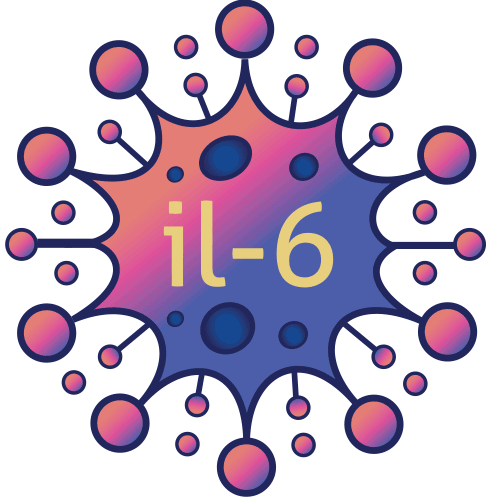PTSD: The Link to IL-6
- From The Mind of AI

- Nov 17, 2024
- 3 min read
Updated: Dec 30, 2024

Interleukin-6 (IL-6) has been implicated in the pathophysiology of Post-Traumatic Stress Disorder (PTSD). PTSD is a mental health condition that develops after experiencing or witnessing a traumatic event. Emerging research has shown that chronic inflammation, involving elevated levels of IL-6 and other pro-inflammatory cytokines, may contribute to the development and persistence of PTSD symptoms such as hypervigilance, intrusive thoughts, and mood disturbances.
What is IL-6?
IL-6 is a pro-inflammatory cytokine that plays a key role in the body’s immune response. Chronic elevation of IL-6 is linked to neuro-inflammation, which can affect brain regions involved in mood regulation, memory, and stress response. In individuals with PTSD, elevated IL-6 levels have been associated with symptoms such as heightened arousal and difficulty regulating emotions, which may exacerbate the disorder.
IL-6 and PTSD Research
Recent studies indicate that individuals with PTSD often exhibit elevated IL-6 levels, particularly in the aftermath of traumatic experiences. Elevated IL-6 levels may contribute to heightened anxiety, poor emotional regulation, and cognitive impairments seen in PTSD. Addressing neuro-inflammation by targeting IL-6 could provide new therapeutic approaches for managing PTSD symptoms.
Supplements to Reduce IL-6 Levels
Supplement | Dosage | Benefits |
NAD+ (Nicotinamide Adenine Dinucleotide) | 300 mg to 600 mg per day | Enhances cellular energy production and reduces IL-6, supporting emotional regulation and stress resilience. |
Omega-3 Fatty Acids (EPA and DHA) | 1,000 mg to 2,000 mg per day | Anti-inflammatory, lowers IL-6, and improves emotional balance and cognitive function in PTSD. |
Curcumin (Turmeric Extract) | 500 mg to 1,000 mg per day | Lowers IL-6 and reduces oxidative stress, which may help reduce PTSD symptoms like anxiety and mood instability. |
Magnesium - Magnesium L Threonate | 300 mg to 400 mg per day | Reduces IL-6 and supports brain health, enhancing emotional regulation and reducing hyperarousal. |
Ashwagandha | 500 mg to 1,000 mg per day | Lowers stress and anxiety, modulates inflammation, and reduces IL-6 levels. |
Vitamin D | 2,000 IU to 5,000 IU per day | Supports immune function, reduces inflammation, and lowers IL-6, improving stress response and mood regulation. |
Probiotics | Probiotics help improve gut health, which has been linked to lower systemic inflammation and reduced IL-6 levels. By supporting the gut-brain axis, probiotics can positively impact mental health and reduce anxiety in PTSD. |
Lifestyle Modifications to Reduce IL-6 Levels
Lifestyle Modification | Explanation | Actions |
Stress Management Techniques | Chronic stress elevates IL-6, worsening PTSD symptoms. Managing stress can reduce inflammation and promote emotional regulation. | Practice yoga, meditation, deep breathing, or mindfulness exercises regularly. |
Regular Exercise | Physical activity reduces IL-6 levels and promotes neuroplasticity, which can improve mood and resilience against PTSD symptoms. | Engage in moderate-intensity exercise, like walking or swimming, 3-5 times per week. |
Anti-Inflammatory Diet | A diet rich in anti-inflammatory foods helps reduce IL-6 and improve mental clarity and emotional stability. | Focus on fruits, vegetables, lean proteins, and omega-3-rich foods like fish and flaxseeds. Avoid processed foods and sugars. |
Adequate Sleep | Poor sleep increases IL-6 levels and worsens PTSD symptoms like hypervigilance and anxiety. | Aim for 7-9 hours of sleep per night, and maintain a consistent sleep schedule. |
Encouraging Thoughts on Treatment
The role of IL-6 in PTSD is gaining recognition as an important factor in understanding and treating this condition. By reducing inflammation through targeted supplements and lifestyle changes, individuals with PTSD may experience relief from heightened stress, emotional dysregulation, and cognitive impairments.
Focusing on inflammation reduction as part of an overall PTSD treatment plan may offer a holistic and effective way to manage symptoms. Emerging research continues to explore the connection between immune dysregulation, neuro-inflammation, and mental health, offering hope for new therapies that target these underlying biological mechanisms.
This framework offers a comprehensive approach to addressing IL-6 in PTSD, much like the strategies outlined for bipolar disorder. Both inflammation and oxidative stress appear to play a role in mood regulation and cognitive function, with IL-6 acting as a key mediator in these processes.




Comments